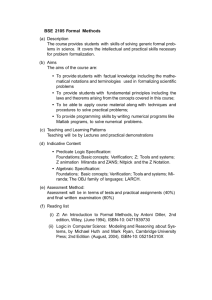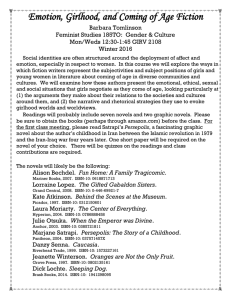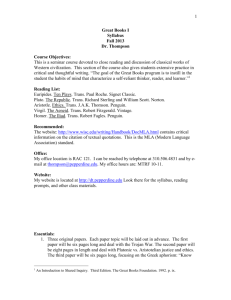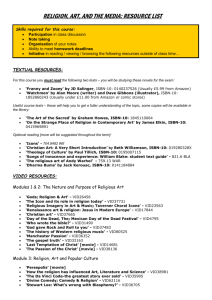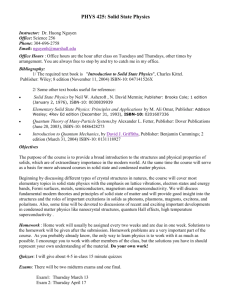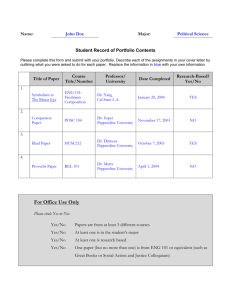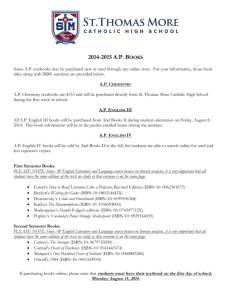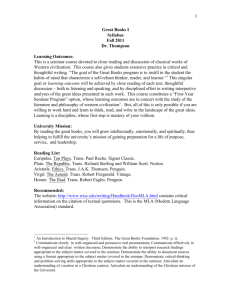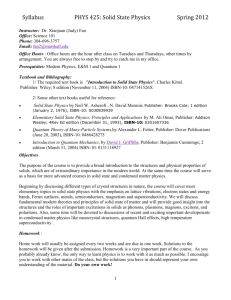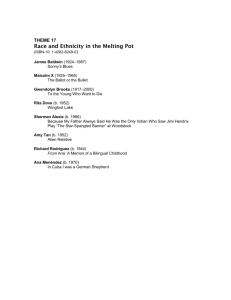Syllabus - Don Thompson's Homepage
advertisement
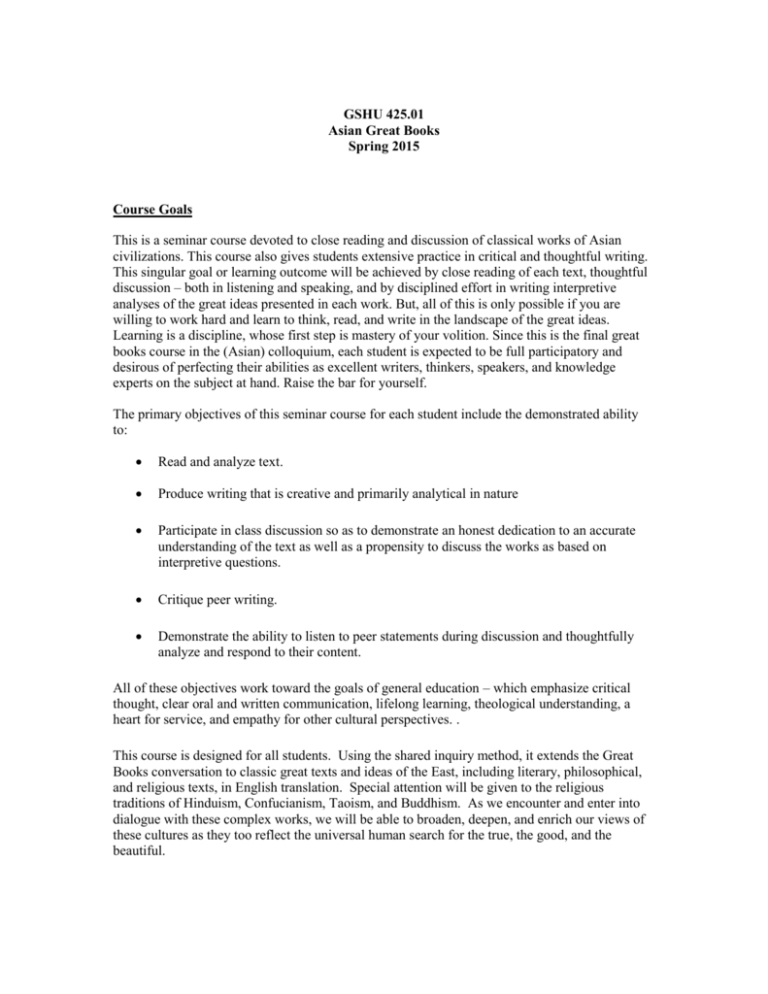
GSHU 425.01 Asian Great Books Spring 2015 Course Goals This is a seminar course devoted to close reading and discussion of classical works of Asian civilizations. This course also gives students extensive practice in critical and thoughtful writing. This singular goal or learning outcome will be achieved by close reading of each text, thoughtful discussion – both in listening and speaking, and by disciplined effort in writing interpretive analyses of the great ideas presented in each work. But, all of this is only possible if you are willing to work hard and learn to think, read, and write in the landscape of the great ideas. Learning is a discipline, whose first step is mastery of your volition. Since this is the final great books course in the (Asian) colloquium, each student is expected to be full participatory and desirous of perfecting their abilities as excellent writers, thinkers, speakers, and knowledge experts on the subject at hand. Raise the bar for yourself. The primary objectives of this seminar course for each student include the demonstrated ability to: Read and analyze text. Produce writing that is creative and primarily analytical in nature Participate in class discussion so as to demonstrate an honest dedication to an accurate understanding of the text as well as a propensity to discuss the works as based on interpretive questions. Critique peer writing. Demonstrate the ability to listen to peer statements during discussion and thoughtfully analyze and respond to their content. All of these objectives work toward the goals of general education – which emphasize critical thought, clear oral and written communication, lifelong learning, theological understanding, a heart for service, and empathy for other cultural perspectives. . This course is designed for all students. Using the shared inquiry method, it extends the Great Books conversation to classic great texts and ideas of the East, including literary, philosophical, and religious texts, in English translation. Special attention will be given to the religious traditions of Hinduism, Confucianism, Taoism, and Buddhism. As we encounter and enter into dialogue with these complex works, we will be able to broaden, deepen, and enrich our views of these cultures as they too reflect the universal human search for the true, the good, and the beautiful. 2 • This course fulfills the Non-Western General Education Requirement because of its coverage of classic Asian texts and because it challenges the student’s critical thinking and writing expertise as well as their ability to integrate the philosophy and literature of other traditions into their own. University Mission By reading the great books, you will grow intellectually, emotionally, and spiritually, thus helping to fulfill the university’s mission of gaining preparation for a life of purpose, service, and leadership. Instructor Don Thompson - Phone: 310.506.4831- Office: RAC 121 - E-mail: thompson@pepperdine.edu Web dt.pepperdine.edu Office Hours M 2-3, R 2-3 Texts: The Ramayana: Trans. R.K. Narayan. Penguin. ISBN-13: 9780143039679 The Mahabharata: Trans. C.V. Narasimhan. Columbia Press. ISBN-10:-231110552. The Bhagavad-Gita.Krishna’s Counsel in Time of War.Trans. Barbara Stoler Miller. Bantam. ISBN-10: 0553213652 The Analects of Confucius (Translations from the Asian Classics). Burton Watson. Columbia University Press. ISBN-10: 0231141653 Tao Te Ching. Lao-Tzu. Trans. Stephen Addiss and Stanley Lombardo. Hackett.ISBN10: 1590305469 Chuang Tzu – Basic Writings. Burton Watson. Columbia U. Press ISBN-10: 0231105959 The Heart of the Buddha’s Teaching. Thich Nhat Hanh. Broadway Books. ISBN-13: 9780767903691 The Gateless Gate – The Classic Book of Zen Koans. Koun Yamada. Wisdom Publications – Boston. ISBN-10: 0861713826 The Tale of Genji. Murasaki Shikibu. Transl. Edward G. Seidensticker. Vintage Classics. ISBN-10: 0679729534 On Love and Barley – Haiku of Basho. Trans. Lucien Stryk. Penguin. ISBN-10: 0140444599 Hojoki – Visions of a Torn World. Kamo-no-Chomei. Trans Yasuhiko Moriguchi & David Jenkins. Stone Bridge Press. ISBN-10: 1880656221 Punctual attendance You are expected to attend every class, and to arrive on time. If you must miss class because of illness or a family emergency, please e-mail or otherwise notify us before class. A late 3 arrival disperses the focus of the class – and focus is essential to good conversation. Unexcused absences will lower your grade in the course. Grades Your numerous assignments will, of course, be evaluated, and your final grade will be determined as follows: Class discussion: 10% 5 page essay on Ramayana, Mahabharata, and Bhagavad-Gita due February 13: 20% 5 page essay on Confucius, Tao Te Ching, & Chuang Tzu due March 20: 20% 5 page essay on Buddha’s Teaching and Zen Buddhism due April 3: 20% 5 page essay on Genji, Basho, and Hojoki due April 30: 20% In class writing: 10% Each 5 page essay is due at 11:59 p.m. via email attachment. Class Cancellations: Class will not meet on March 26. Initial Schedule for Reading and Writing: Ramayana (3), Mahabharata (3), Bhagavad-Gita (2), Analects(2), Tao Te Ching (2), Chuang Tzu (2), Calligraphy (1), Heart of the Buddha’s Teaching (2), Gateless Gate (2), Genji (3), Basho(1.5), Ikebana (0.5), Hojoki (1). Plagiarism: May result in an automatic failure in the class. It is plagiarism if you (1) borrow a paper from another student, (2) turn in a paper written by any other person, (3) take material (pages, paragraphs, sentences, or ideas) from any printed source without giving credit. See http://seaver.pepperdine.edu/academicintegrity. Disability Services Any student with a documented disability (physical, learning, or psychological) needing academic accommodations should contact the Disability Services Office (Main Campus, Tyler Campus Center 264, x6500) as early in the semester as possible. All discussions will remain confidential. Please visit http://www.pepperdine.edu/disabilityservices/ for additional information. Help on writing: Take advantage of my availability for help on writing your papers. You may submit rough drafts in advance of the due date for any paper. Do this by anonymous e-mail attachment by setting up a generic account with a commercial e-mail provider (gmail, yahoo, ...).We also have an excellent writing center located in CAC 123, x4097. See http://seaver.pepperdine.edu/writingcenter/ 4 Recommended The website: http://www.wisc.edu/writing/Handbook/DocMLA.html contains critical information on the citation of textual quotations. This is the MLA (Modern Language Association) standard.
